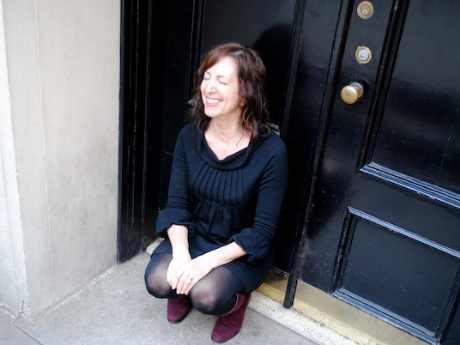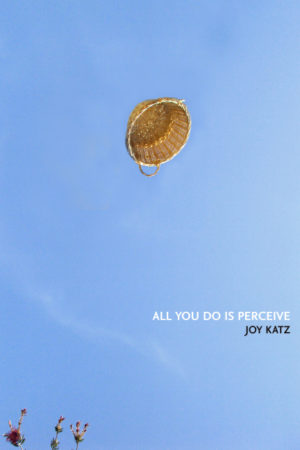In Their Own Words
Joy Katz's “Excuse Me, Where is Varick Street?”

Excuse Me, Where is Varick Street?
Varick, yes. Just—oh Film Forum, sure.
Go straight down Carmine and turn left.
Wait, did I say to turn onto Houston after Varick?
Actually I'm walking that way.
You're welcome.
Actually you can turn here, before Varick:
this street dead-ends at Film Forum.
In fact, I'm going to Film Forum.
Would you like me to carry you?
I was going to carry something anyway.
Did I say to walk through the air molecules on the southwest corner of—?
Let's count forty blocks of sidewalk.
No, wait, thirty-seven paving stones to the corner.
The ticket window is there, on the south side of Houston.
Coincidentally, I'm also going to see the Tarkovsky.
I am ploughing and harrowing my soul,
rendering it capable of turning to good.
Two, please.
I was going to buy two tickets anyway, my pleasure.
The brownies here are delicious.
In fact I'm going to get one.
Here, let me feed it to you.
I am good for you.
I am good also for lost Japanese women,
for the boys in Big Brothers Big Sisters
(I am always seated next to them at weddings),
for the aggrieved,
the grieving, the recently blind—
Are you going to sit there?
Coincidentally I am also going to sit there.
Can you see out of my eyeholes? Are you comfortable?
From All You Do Is Perceive (Four Way Books, 2014). All rights reserved. Reprinted with the permission of the author.
On "Excuse Me, Where is Varick Street?"
I began to draft this poem when I lived in New York, after one of many times someone stopped me and asked for directions.
The draft began as a conversation between me and an "offstage" character. Almost a monologue, but not quite. What drove me to the page is that I felt helplessly pleasant when asked for assistance. The sensation was awful on some level. I look like a nice, unthreatening person. And I am. Yet something about that is slightly intolerable. I kept writing to try to understand why. It has to do with power—power is at play in this poem. I am far from being a power-hungry person, but where is the line between helpfulness and manipulation? That question seemed the burning center of the writing.
As I worked, I discovered that the "I" in the poem is very elastic. I could push it farther and farther away from myself, but it was still attached to me. This is different than other instances of "I" in my work. Usually the "I" is at a fixed distance from me, Joy. Sometimes quite close, sometimes far—almost fictional. Whatever the distance, the poem maintains it as a constant. By contrast, in "Varick Street," the "I" begins fully overlapping with me, but by the end, it's not me at all. This "I" goes so far in fulfilling the lost person's request that the poem turns into a hostile takeover of someone's soul. A hijacking of perceptions.
Strangely, the more time goes by since I wrote this poem, the more recent it seems. I am at work on a new project, about race. In writing poetry as a white American, I've come to distrust my sense of empathy. Empathy and narcissism aren't that far apart. My perceptions of others, especially across a color line, are problematic. I have a heart and you have a heart, but that doesn't mean I understand anything about your experience. So any impulse I have to help, heal, or nurture is deeply troublesome. Even potentially harmful. This is interesting. I haven't figured out how to write these new poems. They all seem to be catching up to this one, which I wrote quite a while ago. I don't think I understood the full irony of "can you see out of my eyeholes?" until recently.
It was fun to discover this poem as I wrote it, and it is fun to perform. "Varick Street" makes use of performance and voice, two aspects of poetry I didn't consider when I started out writing but that have become important to me.




